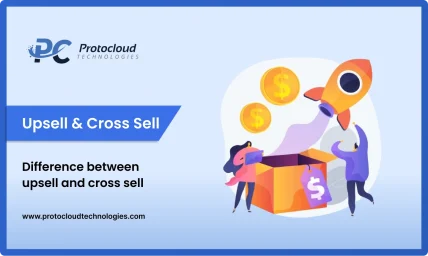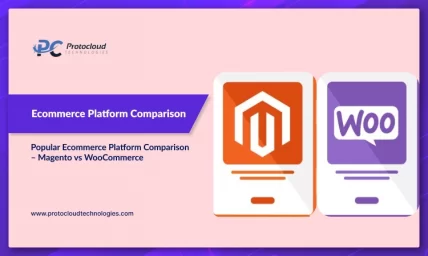Because of how connected the world is now and how quickly technology is changing things, digital commerce has become an important part of modern business plans.
Digital commerce includes a wide range of activities, such as online markets and mobile payments, that let businesses interact with customers and do business easily online.
Need help with Website Development?
Tell us about your project and get a free quote.
This article will go into detail about DC, look at the big trends that are changing it, explain how it’s different from e-commerce, stress how important it is, give you step-by-step instructions on how to get started, look at business models, and talk about the problems that come up in this ever-changing world.
What is Digital Commerce?

When people buy and sell things and services using digital channels like the Internet, mobile apps, social media sites, and other digital technologies, this is called digital commerce. It includes a lot of different things, like digital marketing, mobile payments, electronic fund transfers, customer relationship management, and managing the supply chain.
What Are Major Digital Commerce Trends?
Omni channel shopping

The coming together of online and offline outlets to give customers a smooth shopping experience at all points of contact.
Mobile Shopping

As smartphones become more popular, people are using them more and more to look and buy things while they’re on the go.

Smart computers and machines that learn

People are using these technologies to make shopping more personal, find the best price points, and improve customer service.
Adding to reality (AR) and making it real (VR)

With these immersive technologies, people can see and feel products before they buy them, which changes how they connect with products.
Voice Business

A rise in virtual assistants like Apple’s Siri and Amazon’s Alexa has made voice-enabled shopping possible, letting people buy things by speaking orders.
Difference Between Digital Commerce and E-Commerce:
While DC and e-commerce are often used interchangeably, there are subtle differences between the two:
- E-commerce is usually used to describe deals that happen over the internet, while digital commerce includes more than just buying and selling things online.
- E-commerce is mostly about buying things online, while digital commerce includes things like digital marketing, mobile payments, and supply chain management.
Why is Digital Commerce Important?
Digital commerce has become increasingly important for businesses due to several factors:
World Reach

Businesses can reach customers all over the world and enter new markets without having to open real stores.
Want SEO/Digital Marketing Services?
Want to increase traffic and boost sales? Book a Free consultation call with our Expert!
Easy access

Digital commerce is convenient for both buyers and sellers because it lets people access goods and services from anywhere with an internet link, 24 hours a day, 7 days a week.
Making things unique

Businesses can collect and study data about their customers using digital technologies. This lets them send personalized marketing messages and suggest products.
Savings on costs

Digital commerce can help businesses save a lot of money by getting rid of the need for real storefronts and streamlining operations.
An edge over the competition

Businesses that use digital commerce are better able to stay competitive and adapt to changing customer tastes in today’s digital-first world.
5 Steps You Can Take Now to Start With Digital Commerce:
Build your brand online.

Make a website or a mobile app that lets people look at your goods or services and buy them. Contact protolcoud technologies experts for more details.
Mobile-friendly website

To accommodate the rising number of mobile shoppers, make sure that your website or app works well on phones.
Adopt digital marketing

Spend money on digital marketing tools like email marketing, social media, and search engine optimization (SEO) to reach your target group and get them involved.
Use safe payment methods.

Pick a safe payment gateway to make online purchases easier and build trust with your customers.
Use analytics for data

Data analytics tools can help you understand how your customers act, make your marketing more effective, and make the whole experience better for your customers.
Want to Optimize/Customize your website or App?
Book a Free consultation call with our Expert!
Digital Commerce Business Models
Client-to-Customer (B2C)

In this model, companies sell goods and services to customers directly through digital outlets like websites, mobile apps, and social media sites.
It applies to many different types of businesses and lets businesses uniquely interact with each customer, making their shopping experience easier and more accessible.
Business-to-Business, or B2B

One business sells goods or services to another company through digital platforms in this model.
Most of the time, these deals involve bigger amounts and products or services that are specifically made to meet the wants of other businesses.
Through effective communication and transaction management tools, business-to-business (B2B) digital commerce platforms make transactions go more smoothly, streamline the buying process, and build better business relationships.
Consumer-to-Consumer (C2C)

Marketplaces for customers to connect, like eBay and Airbnb, make it easier for people to buy, sell, or rent goods and services directly from one another.
C2C digital commerce platforms offer a market where people can do trades with each other, letting them make money off of assets that aren’t being used or discover unique goods or services from other customers.
A lot of the time, these sites have trust-building features like ratings and reviews from other users.
Based on subscriptions

Recurring revenue is how companies that offer subscription-based services make money.
Customers pay a fee regularly to access goods, services, or content. A lot of businesses use this approach, like those that stream media, offer software as a service (SaaS), and sell subscription boxes.
Businesses can be sure of steady income streams and loyal customers thanks to subscription-based digital shopping. Customers can always access valuable products and services.
The Market

Companies like Amazon and Etsy that sell things online act as digital markets where buyers and sellers can meet and do business.
People can list their goods or services, and people can look through them and buy straight from the sellers. Marketplaces make it easier for people to buy and sell things by processing payments and giving sellers a place to reach more people.
Listing fees or commissions are what marketplaces usually charge sellers in return for their services. This is a deal that works out well for everyone involved.
Challenges in Digital Commerce
Safety online

As the number of online transactions grows, cyber threats like identity theft and data breaches become more common. These threats put businesses and customers at great risk.
Changing to digital

A lot of businesses have trouble going digital because they have old systems, methods, and people who don’t want to change.
Compliance with Regulations

There are a lot of rules and laws that affect digital commerce. These include consumer protection laws, tax laws, and data security laws.
Customer Trust

Businesses need to build and keep trust in the digital world, especially now that there are privacy issues and data breaches.
Problems with the supply chain

The COVID-19 pandemic showed how easily supply chains can be messed up. This made it even more important for companies to have flexible and strong supply chain plans.
Wants to implement Digital commerce for your brand?
Want to know the exact cost? Get a free consultation from our experts Today.
Conclusion
Digital tools are always changing the way businesses work, and digital commerces will stay at the forefront of new ideas and growth.
Businesses can find new possibilities, reach customers all over the world, and stay competitive in a world that is becoming more and more digital if they use digital commerce.
But to get around the complicated world of digital trade, you need to plan, spend money on technology, and know what your customers want and need.
Businesses can do well in the digital world if they keep up with the latest trends, use best practices, and deal with problems before they happen.












